- Home
- John Bellairs
Eyes of the Killer Robot Page 4
Eyes of the Killer Robot Read online
Page 4
"I know you're going to ask," he said, "how are we going to win the contest with a robot? Only human beings are allowed to compete in the contest. You were wondering about that, weren't you?"
"I was, kinda," muttered Johnny.
The professor stopped, spun around, and pointed his finger at the boys. "Well, forget about your worries!" he said loudly. "I think I have it figured out: the robot really was the one that struck out Clutch Klemm back in the old days. I don't know how Sloane made people think the robot was a living, breathing human being, but I'll bet it had something to do with the new source of energy that Sloane discovered."
Johnny was getting more and more bewildered. "Energy source? Professor, you never said anything about that before!"
The professor blinked. "I didn't? I must have left that part out when I told the story. You see, when Sloane rolled his robot out and demonstrated it to the baseball players, no one could figure out how it worked. There wasn't any steam or exhaust smoke pouring out of it, so everyone figured there had to be one of those electric motors inside it. But when Sloane let them see the inside of the robot, the players saw only gears and machinery, no motor! In those days, an electric motor would've been big and heavy, and it would have been hooked up to big heavy batteries or a generator. But there wasn't any such thing in the robot. Well, something ran the blasted thing! I can't figure out what this energy source was, but it allowed Sloane to create an illusion when he brought the robot back later. I don't know how he made people think the robot was a man. I don't know how he made the blamed thing run. That's what fascinates me! The answer may be hidden away somewhere, gathering dust in a storeroom or an old shed. Doesn't that rouse your spirit of adventure?"
Fergie looked skeptical. "Look, prof," he said slowly, "if this Sloane character really did discover a new source of energy, wouldn't he have sold it to the government for a million bucks?"
The professor shook his head. "No. A sane person would have done that, but Evaristus Sloane was crazy. And he was very, very secretive. He probably decided that nobody deserved to know about his wonderful secret. Of course, it's possible that he smashed the robot and burned all his plans. But it's also possible that he didn't."
"Do you know where the robot could be, professor?" asked Johnny timidly.
The professor bit his lip and looked uncertain. "It could be up in Sloane's old house, in New Hampshire—a little bitty burg called Stark Corners. I'm planning to drive up this weekend. You two are welcome to come along, but by golly, if I have to, I'll go alone! Well, what do you yardbirds say?"
Fergie and Johnny looked at each other. They both thought that all this stuff about robots and secret energy sources was looney. But they didn't have anything wonderful planned for the weekend, and they both enjoyed going on car trips with the professor. And the idea appealed to their love of adventure. Even if they only found an old rusting heap of metal that had once been a robot, they would be doing something interesting. After a long pause, Fergie spoke up.
"Prof?"
"Yes, Byron? What is it?"
"Well, uh... we wanta have a conference. Johnny and me, that is."
The professor smirked. "A high-level conference! Gracious me, I ought to feel honored to have it held under my roof. Certainly, by all means! Go right ahead!"
The two boys got up and went out to the dining room. They closed the heavy oak door and talked in low tones for about five minutes, and then they came back. Fergie plunked himself down in a chair, folded his arms, and looked at the professor.
"Okay, prof," he said crisply. "Here's what we decided: We'd like to go along with you, but if we don't find anything right away, we wanta have some fun. You know what I mean?"
The professor smiled sourly. "Gentlemen," he said, "I have no desire to spend the entire weekend prying up floorboards in old barns in New Hampshire. You have my solemn promise: If we don't find anything by Saturday night, we will give up. And then we'll have all day Sunday to cruise around the White Mountains and look at the pretty leaves. But before we go, I'd like to say one thing: I'm not promising you a wonderful adventure. We might end up being bored out of our ever-loving minds. On the other hand, you never can tell—we might uncover some wonderful mystery that has been hidden from the world for a long time."
CHAPTER FIVE
The next few days were spent in a flurry of activity as the three travelers got ready for their trip. The professor made reservations at the General Stark Inn, in Stark Corners, and he got his car oiled and gassed up to go. Fergie got permission from his parents to go on the trip— they were happy that he would get a chance to drive up into the White Mountains and see the lovely fall foliage. Johnny's gramma and grampa were also glad that he could go away for a while with his two best friends, the professor and Fergie. So both boys packed and phoned each other up to talk and plan. But they did not say a single word to anyone else about the real purpose of this so-called vacation journey.
Friday afternoon came, and the boys left with the professor in a cloud of exhaust smoke. The skies were black, and it was pouring rain—not great weather for traveling, but as the professor said, it would probably let up sometime. The old maroon Pontiac crawled while the windshield wipers slashed away at the rain, and the boys sang Scouting songs to keep their spirits up. As they drove, the professor tried to point out some scenic spots, like Mount Nancy and Mount Bemis, but they were just vague shapes behind gray veils of rain. Finally, around six in the evening, they pulled into Stark Corners.
There wasn't much to the town: a bandstand on a little patch of grass, some restaurants, two gas stations, a church, a doctor's office, and a few stores. At the far end of the main street stood a two-story white inn with a long front porch. The weathered signboard outside showed a picture of General John Stark, the cantankerous New Hampshire-man who had fought in the Revolutionary War.
"Is this where we're stayin'?" asked Fergie in a disappointed tone. "It looks like a haunted house."
"It is not in the least like a haunted house," said the professor primly. "It is a very fine old inn that has been in the same family for generations—at least, that is what my guidebook says. Now, come on. Let's drag our suitcases inside and see where they're going to put us."
As the rain pelted down, the professor unlocked the trunk and handed each boy his suitcase. Then he took out his own cracked leather valise and stomped up the creaky steps to the front door. Before he could push the door bell, the door swung open, and there stood a frowning middle-aged woman with a bun of gray hair. She wore a calico apron over her dress, and the apron had flour stains on it.
"Lousy weather ain't it?" she said, and quite suddenly she smiled. The smile made Johnny feel enormously relieved—he was always frightened by crabby people.
"Lousy is the word," said the professor as he stepped inside and shook water off the sleeve of his raincoat. Then he held out his hand. "I'm the Roderick Childermass who called earlier this week. I asked for two rooms for the weekend—a double room for the boys, and a single one for myself. I do hope you've held them for us."
"Pleased to meet you, Mr. Childermass," said the woman, shaking his hand. "I'm Anstis Barnstable. I'm the owner, as you may have guessed. Your rooms are upstairs, and we'll be serving dinner in about twenty minutes. Would you folks like to wash up and get yourselves organized?"
"We would indeed!" said the professor with a satisfied sigh. "Lead on."
A short while later, the professor, Johnny, and Fergie, who were the only guests in the inn, joined Mrs. Barnstable at a table in the long, narrow dining room. Rain pattered at the windows, but inside everything was warm and cozy. A wood stove at one end of the room took away the evening chill, and on the tablecloth were old-fashioned white china plates, tureens, and platters. The meal was a New England boiled dinner: big chunks of beef, potatoes, carrots, and onions swimming in hot broth. The boys dug in greedily, and so did the professor—they hadn't had much to eat for lunch, and they were starved. By the time the dessert was se
rved, the professor was feeling a bit more relaxed and at home, and he decided to shift the conversation to see if he could find out anything about good old Evaristus Sloane.
"Uh... wasn't there an inventor who used to live in this town?" he asked casually as he lit his after-dinner cigarette. "Some character named Settle or Sumner or something like that?"
Immediately Mrs. Barnstable stiffened. "Where on earth did you ever hear of that awful man?" she asked. "People hereabouts have been trying hard to forget about him."
The professor coughed and glanced away quickly. "Hem! Well, I'm certainly not trying to be nosy, but John's grandfather told him a silly story about a robot that this man had made, and—"
"I hope that's all he told him," said Mrs. Barnstable severely. "There are stories about Evaristus Sloane that are hardly fit for children to hear. He was an evil, twisted person. Do you suppose we can talk about something more pleasant? Boys, would you like another piece of pie? There's plenty in the kitchen."
The professor was surprised. He really hadn't expected to get such a bad reaction when he mentioned the old inventor's name. However, he knew that it wouldn't do to get pushy, so he shrugged and apologized for bringing up such an unpleasant subject. Then, after Mrs. Barnstable had gone to the kitchen, he leaned over and whispered hoarsely to the boys.
"Sounds like old Sloane was a real winner, eh? I knew he was weird, but this lady seems to think he was the devil in human form."
"I guess we better not ask her anything more about him, huh, professor?" said Johnny nervously.
"I suppose not," said the professor. "And we'd better not ask where his house was, unless we want to get tossed out on our ears. Oh, well—we can find out more from somebody else, I suppose."
"You hope," grumbled Fergie. He had been pessimistic about this trip before, and he was even more so now.
After dinner the three travelers went to the parlor to relax. The professor read the paper, and Johnny and Fergie played chess. When ten o'clock came, they were all ready for bed, and they went upstairs and slept soundly. In the morning, when he got up, Johnny saw that the rain had stopped. Sunlight was streaming in through the windows, and little pinkish-gray clouds were drifting over the mountains in the distance. The door to the hall was open, and Johnny could hear the professor singing Latin hymns as he took his morning shower in the bathroom down the hall. Fergie's sheets were rumpled and twisted up at the end of his bed, but he was nowhere to be seen. Probably he was down at breakfast gorging himself—he had always been an early riser. Johnny felt cheerful and optimistic, though he really didn't know why. He whistled and walked around the room several times, and then he slumped into an armchair by the window and started leafing through a copy of New Hampshire Profiles, a tourist magazine that he had found lying on the windowsill. Suddenly he stopped turning pages and stared at an article entitled THE HOUSE OF EVARISTUS SLOANE—IS IT HAUNTED? At the top of the page was a pen-and-ink drawing of a stone house built against a cliff side, halfway up a tree-covered mountain.
Johnny swallowed hard. His heart began to beat faster, and the palms of his hands felt sweaty. He tried to read the first sentence of the article, but it was just a blur before his eyes. Then he heard somebody behind him clear his throat.
With a little nervous yelp, Johnny dropped the magazine and leaped out of the chair. He turned and stared wildly at the door, and then he heaved a deep sigh of relief. It was the professor. He was in his bathrobe, and a towel was draped around his neck.
"Good heavens, John!" exclaimed the old man. "Do you always react that way when someone drops by? Calm down! I just wanted to tell you that the bathroom is free whenever you want to use it. Okay?"
Johnny was trembling all over. He opened his mouth to speak, but he could hardly get the words out. "I... there's this magazine, and it says... it says that..."
"Yes?" snapped the professor irritably. "There's a magazine, and it says what?"
Instead of answering, Johnny turned and looked down at the place where he had dropped the magazine. But the magazine was gone.
"Oh... oh, my gosh ..." Johnny stammered. He felt cold all over, and he shuddered. "It... it was right there, it really was. But now it's gone!"
The professor folded his arms and cocked his head to one side. He pursed his lips skeptically. "John," he said, "are you sure you didn't just fall asleep in your chair? What's all this nonsense about a magazine that isn't there?"
Johnny got more flustered than ever. He stooped and tilted the armchair sideways. But there was nothing under it. With a sad look the professor walked across the room and put his hand gently on Johnny's arm.
"John," he said quietly, "you must have had a little dream when you dozed off in the armchair a few minutes ago. Now scoot on down the hall and brush your teeth while I get into some clothes. This looks like a beautiful day, and we're all going to go exploring."
Johnny's mind was in a whirl. Could the professor possibly be right? Were the magazine and the article just a dream? But he had been wide awake when he found the magazine—he was very sure of that. On the other hand, it would not do to argue with the professor. So Johnny just shrugged his shoulders helplessly and started on down the hall toward the bathroom.
After breakfast, Fergie, Johnny, and the professor left the inn and took a short walk down the main street of the town. They stopped at a variety store and bought a newspaper and some candy bars. While the boys stood around looking at comic books, the professor tried to get some information out of the owner of the store.
"Have you ever heard of this Evaristus Sloane character?" he asked as he lit a black and gold cigarette. "You know, the nutty inventor?"
The owner frowned. "Yes, I have," he said sourly. "What about him?"
The professor hemmed and hawed. "Oh, well... you see, the fact is, I'm writing a book on old New Hampshire legends, and I want to do a little piece on Sloane. Is it true he used to live in Stark Corners?"
The owner grunted. "Not exactly in the town. He lived in a house halfway up Mount Creed, which is the big mountain that kinda hangs over the town. You go outa town 'bout half a mile on Burnt Mill Road, an' there's this dirt road that leads on up the mountain. If you take my advice, you'll leave your car down at the bottom—road's not in too great a shape. Anyways, the house is 'bout a half hour walk up the road. It's all closed up an' fallin' to pieces, an' if you want some more advice, I wouldn't hang around after sunset."
The professor stared. "Why not?"
The owner gave the professor a quick, nervous glance. "Well, there's a lot o' broken boards an' nails in the yard, an' there's an old cistern with a wooden cover that's all rotted out. You might fall in an' hurt yerself. Y'know what I mean?"
The professor stared harder. There was something about the way the owner was acting that was very creepy and unnerving. "Humph!" snorted the professor as he stubbed his cigarette out in an ashtray that stood on the counter. "Well, thank you for the advice and the directions." He turned and motioned toward Johnny and Fergie. "Come on, boys. We've got a little car ride and a hike ahead of us."
The boys grinned and put the comic books back in the rack. Then they followed the professor out the door and down the sidewalk toward the inn.
"I hate people who won't give you a straight answer," grumbled the professor as they walked along. "If the old fool thinks there are any ghosts up at Sloane's house, why the blue blazes doesn't he say so? Nails, my foot! Rotten cistern cover! He just didn't have the decency to say what he meant!"
Maybe he thought you'd laugh at him, thought Johnny. He was still unhappy about the way the professor had brushed off his story about the disappearing magazine.
When they arrived at the inn, Fergie and Johnny waited downstairs while the professor went up to his room and got his camera, pocket compass, and sunglasses.
"All right, boys!" he said as he shoved the camera into Fergie's hands. "Are you ready to inspect that nest of spooks and spectres?"
Fergie and Johnny nodded, and they al
l got into the car. The engine roared, and off they went. When they were about a half mile out of town, the professor slowed down and started looking for the place where they were supposed to turn off. As they rounded a curve, they saw it: a rutty little dirt road running up into the trees that covered the mountain. The professor swerved the car left, and they started bouncing and jolting up the mountain road. Fergie was in the backseat. He leaned forward and started talking into the professor's ear.
"Hey, prof," he said, "I don't like to crab, but didn't that guy in the store say we shouldn't try to drive up this road?"
"Yeah," said Johnny, who was sitting up in front next to the professor. "I think he did say that."
"I know what the man said!" the professor muttered testily. "But for the time being, the road seems passable, and—"
The professor's little speech was interrupted by a loud musical bonggg! A rock had hit the underside of the car. But the professor did not stop. He drove on, and the car jolted and jounced, and the springs squealed and complained. Finally, after a few twists and turns, the road became totally impossible: it turned into a pair of ruts with boulders jutting up here and there, and even the professor could see that driving on was useless. With a muttered curse, he pulled off onto a sandy shoulder, and they all got out.
It was a good morning for a hike. The sun was shining, and the maple trees were aflame with red and yellow and orange leaves. For half an hour they slogged up the steep, rocky road. Finally they came to a little meadow full of tall bearded grass and purple pieweed. And there was the house. It was made of yellowish sandstone, and it had a steep-pitched roof and narrow, pointed gables. The place looked utterly abandoned: the downstairs windows were boarded up, and the porch sagged. As they trudged across the meadow toward the house, Johnny tripped over a square board that lay hidden in the grass. It was a weathered for SALE sign.
"I'm not surprised they had trouble selling this dump," said the professor as he glanced at the sign. "You'd have to be a little dotty to want to live up here the year round. Can you imagine how lonely it would be in the winter? And it's much too grim and gloomy to be a vacation home." He gave the sign a little kick and walked on toward the house.

 The Curse of the Blue Figurine
The Curse of the Blue Figurine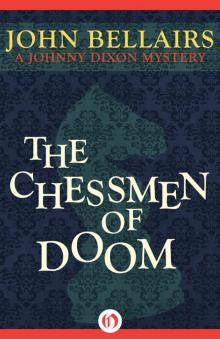 Chessmen of Doom
Chessmen of Doom Secret of the Underground Room
Secret of the Underground Room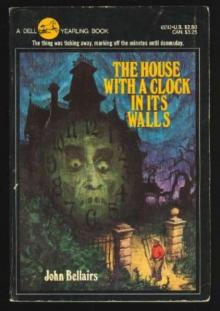 The House With a Clock in Its Walls
The House With a Clock in Its Walls The Vengeance of the Witch-Finder
The Vengeance of the Witch-Finder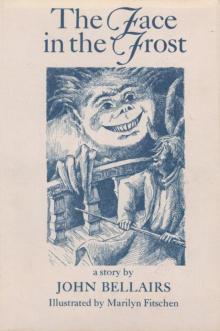 The Face in the Frost
The Face in the Frost Revenge of the Wizard's Ghost
Revenge of the Wizard's Ghost Spell of the Sorcerer's Skull
Spell of the Sorcerer's Skull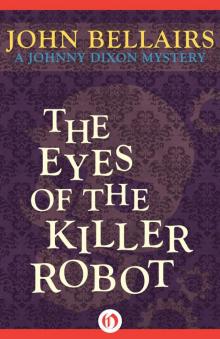 Eyes of the Killer Robot
Eyes of the Killer Robot Mummy, the Will, and the Crypt
Mummy, the Will, and the Crypt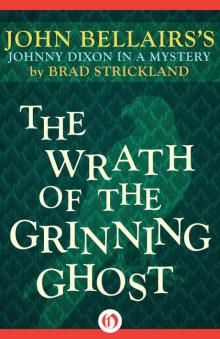 Wrath of the Grinning Ghost
Wrath of the Grinning Ghost The Mansion in the Mist
The Mansion in the Mist The Doom of the Haunted Opera
The Doom of the Haunted Opera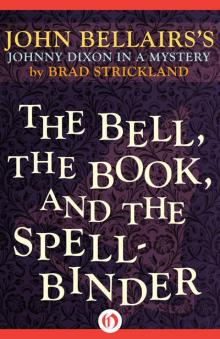 The Bell, the Book, and the Spellbinder
The Bell, the Book, and the Spellbinder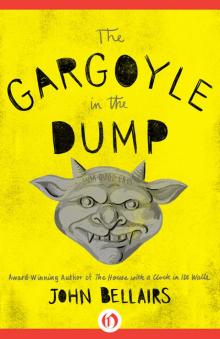 The Gargoyle in the Dump
The Gargoyle in the Dump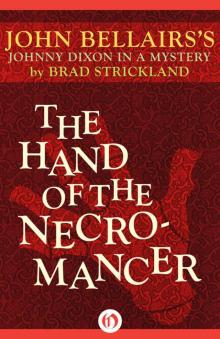 The Hand of the Necromancer
The Hand of the Necromancer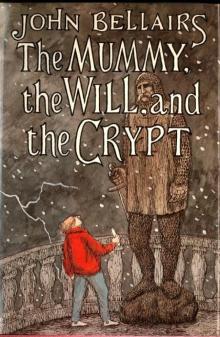 The Mummy, the Will, and the Crypt
The Mummy, the Will, and the Crypt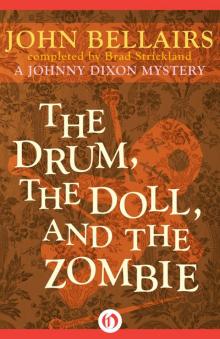 Drum, the Doll, and the Zombie
Drum, the Doll, and the Zombie The Specter from the Magician's Museum
The Specter from the Magician's Museum The Letter, the Witch, and the Ring
The Letter, the Witch, and the Ring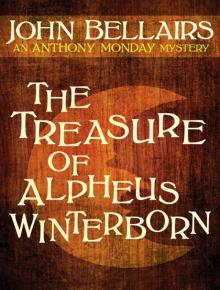 The Treasure of Alpheus Winterborn
The Treasure of Alpheus Winterborn The Dark Secret of Weatherend
The Dark Secret of Weatherend The Figure in the Shadows
The Figure in the Shadows